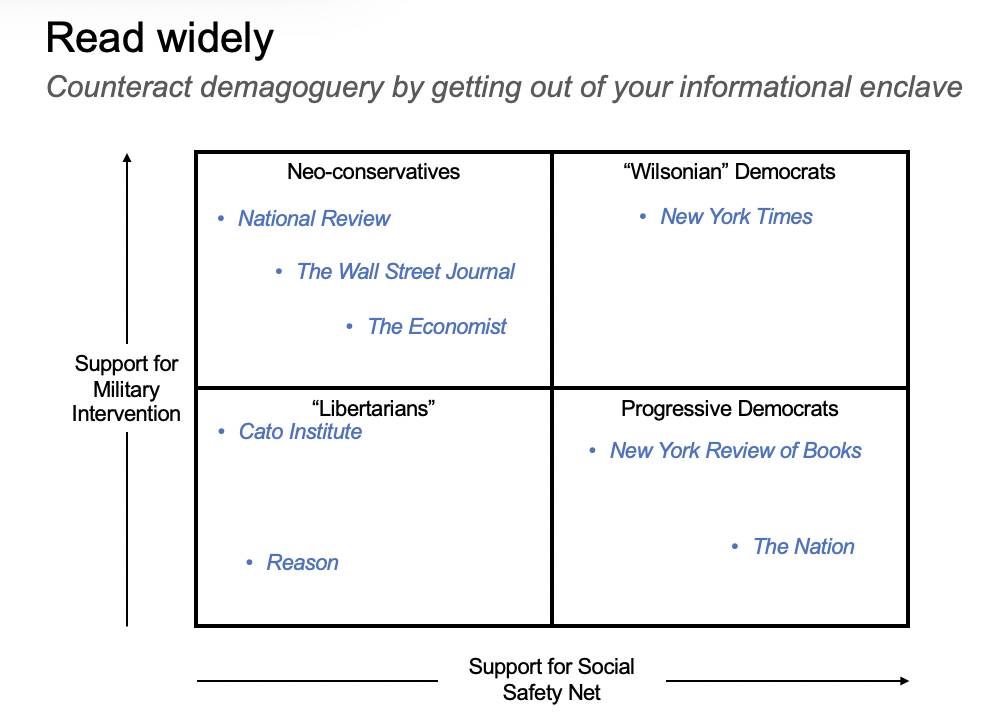
I wrote a bunch of posts called “Arguing with Trump supporters,” and decided to use the term “Trump supporters,” but “arguing” was really the distinguishing term. I was talking about the group of people who still try to defend Trump, either in person or on the internet. They’re mostly repeating pro-Trump media talking points, and they don’t even try to defend him through rational argumentation. I’m not sure they ever had reasons to support him, as much as passionate beliefs about him and government.
When James Arthur Ray—a self-help bozo who made his money telling people how to make money (when he made his money telling people how to make money)–was exposed as not only murderously irresponsible, but a person telling people how to be successful when he was underwater in terms of debt, there were blog posts (which have since disappeared) saying that the fact that he had more debts that profit wasn’t evidence that his advice was bad. It was, they said, a kind of success.
In other words, for them, that you have a lot of money to spend means that you’re successful, even if you have that money because you have unmanageable loans, fraudulent claims about your wealth, and skeezy ways of getting the money. They were admiring a con artist.
Trump’s base—his cult [1]—will love that he screwed over the government through fraud. They’re beyond reasoning with, since they have no reasons to support him, and they like that he’s a con artist. (It’s interesting that they don’t realize he’s conning them.) This post is about a different set of people.
That other set of people voted for Trump did give reasons, and did (in 2016 anyway) often engage in rational argumentation to advocate for voting for him.[2] These are the people who in 2016 expressed some ambivalence about voting for him, but who gave reasons for their voting that way, and almost none of those reasons now apply. I wonder about them.
Here were the reasons I heard:
1) they hated HRC;
2) he has no relevant experience, but he’d hire the best people (I heard this a lot);
3) he’s a buffoon, but the GOP will keep him in line;
4) he’d appoint justices who would overturn Roe v. Wade;
5) he’s a good business man, and we need a businessman’s perspective on how to run government;
6) they think Democrats will raise taxes on businesses and the very wealthy, either force businesses to fund ethical health benefits for workers or have substantial government-subsidized healthcare, enforce environmental regulations, promote non-partisan redistricting policies.
So, here’s their situation now.
1) HRC isn’t running.
2) He never hired the best people. As early as 2017 it became clear that the best people won’t work with him because he’s unpredictable, unreliable, and disloyal. (I assume that his inability to hire good lawyers is why Barr is trying to get the DOJ to take over Trump’s worst case.) His personal lawyer is Giuliani, whom no sensible person would hire to fight a parking ticket. In fact, like many narcissists, Trump deliberately hires underqualified people so that they are completely beholden to him. I can’t imagine any of the people who said in 2016 “He’ll hire the best people” looking at whom Trump has hired (and fired) and thinking those are people whom they would hire for anything that requires more intelligence than being a crash test dummy.
3) When people argued in 2016 that the GOP would keep him in line, others said (correctly), that’s exactly what the conservatives said about Hitler. Since, clearly (or not), Trump wasn’t Hitler, his supporters ignored that argument. It wasn’t a claim that Trump would kill all the Jews, but that narcissistic people on the edge of sociopathy can’t be controlled. The better argument (and the one I wish I’d made when arguing with people) was: when has that worked? When has someone as difficult to work with, as narcissistic, as mercurial as Trump ever been controlled by a political party? (The answer is: never.) He isn’t controlled. It’s important to note that people who worked with him have described him as a threat to the country.
4). If your only reason to vote for Trump was that he would appoint enough justices to overturn Roe v. Wade, that’s a done deal. So there’s no longer any reason to vote for him. (I wonder about this one a lot—I think it’s really a moment of truth for whether the people who made this argument actually were all that ambivalent about Trump’s racism, reckless rhetoric, and appalling character.)
5a) This argument–he’s a good businessman–is the only one that the taxes affect. Even his defenders aren’t disputing that Trump lost a lot of money, or that he owes a lot of money–their argument, as far as I can tell, is that The New York Times hasn’t proven fraud (see, for instance, this WSJ editorial— talk about a low bar). If they’re saying his taxes aren’t fraudulent, then they’re saying it’s clear that he made no money from his businesses; he’s wealthy because of his TV show. That’s the reasonable inference.
I have to point out that lots of people in 2016 said that Trump was not a business success, because a reasonable assessment of his assets (even with all his lying and evasion) would lead to that conclusion. In my experience, the people who defended him as a successful businessman when presented with that information had the same argument that defenders of James Arthur Ray had–so what if it was a con and he’s underwater in terms of debt? He’s got money to spend, and that’s success.
5b) It’s interesting that this was exactly the argument made for Bush Jr., which people conveniently forgot when Trump was running. There’s no evidence that businessmen (it’s always men) who go into government make government more efficient. And I always think that’s a weird argument because there are a lot of things one can say about massive corporations, but being efficient with their use of resources isn’t a claim that withstands any scrutiny. So, the notion that a successful businessman would be a great President is one of those things that some people believe but can’t defend rationally.
6) Don’t I wish.
Democrats don’t have a recent history of passing that level of social safety net—the last time was under LBJ. And, even if they did, those policies don’t lead to Stalinist socialism. That’s an empirical claim subject to disproof. Were that narrative right, then there would be countries where people slid slowly—through one democratic socialist policy after another—into Stalinism.
And that country would be?….
In fact, although countries have slid into increasingly authoritarian governments (such as Russia now), no government slid into communist socialism. Israel has been socialist for a long time, after all. So, just to be clear, the fear-mongering about what happens if we adopt universal health care, for instance, has literally no evidence to support the claim that we’ll end up as the USSR.
So, I’m curious what those people will do—will they vote for Trump again?
[1] That is, his base that neither wants nor admires democracy but openly wants an authoritarian government in which someone they feel represents them has unlimited powers. That’s called fascism, in case you’re wondering.
[2] Being able to engage in rational argumentation to support your position doesn’t mean your argument is true or right or ethical, let alone that I agree with it. It’s actually a fairly low bar, so it’s interesting that Trump supporters can’t meet it.








